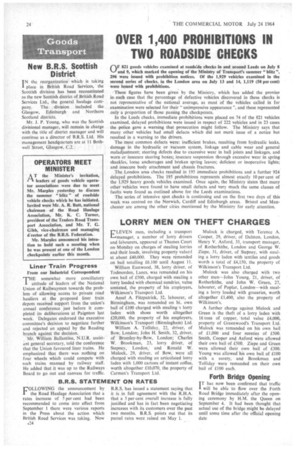OVER 1,400 PROHIBITIONS IN TWO ROADSIDE CHECKS
Page 26

If you've noticed an error in this article please click here to report it so we can fix it.
r-IF 821 goods vehicles examined at roads:de cheeks in and around Leeds on July 8 I–, and 9, which marked the opening of the Ministry of Transport's summer " blitz ", 296 were issued with prohibition notices. Of the 1,929 vehicles examined in the second series of checks, in the London area on July 13 and 14, 1,1E9 (58 percent) were issued with prohibitions.
These figures have been given by the. Ministry, which has added the proviso in cads ease that the percentage of defective vehicles discovered in these checks is not representative of the national average, as most of the Vehicles called in for examination were selected for their " unimpressive appearance ", and these represented only a proportion of those passing the checkpoints.
In the Leeds checks, immediate prohibitions were placed on 74 of the 821 vehicles examined, delayed prohibitions were issued in respect of 222 vehicles and in 23 cases the police gave a warning that prosecution might follow. The Ministry says that many other vehicles had small defects which did not merit issue of a notice but resulted in a warning to the drivers.
The most common defects were: inefficient brakes, resulting from hydraulic leaks, damage in the hydraulic or vacuum system, linkage and cable wear and general maladjustment; steering defects due to excessive wear in ball joints and linkages, and worn or insecure steering boxes; insecure suspension through excessive wear in spring shackles, loose anchorages and broken spring leaves; deficient or inoperative lights; and insecure body attachment and chassis fractures.
The London area checks resulted in 195 immediate prohibitions and a further 924 delayed prohibitions. The 195 prohibitions represents almost exactly 10 per cent of the 1,929 heavy goods vehicles examined. Once again, the Ministry states that many other vehicles were found to have small defects and very much the same classes of faults were found as outlined above for the Leeds examinations.
The series of intensive spot checks is continuing and on the first two days of this week was centred on the Norwich, Cardiff and Edinburgh areas. Bristol and Manchester are among the other cities mentioned by the Ministry for early attention.
















































































































